Qstack Readers Select | December 2024
Queer Substack Favorities - the Inaugural Edition with Robin Reardon
Welcome to the Inaugural Edition of Qstack Readers Select, a bi-monthly, curated selection of queer Substacks—chosen by Qstack readers—highlighting and celebrating the enormous talent of our queer writers.
For this first issue, Qstack contributor Robin Reardon has selected five Substacks that display ongoing commitment to the queer community with great writing.
You can check out Robin’s own previous articles on Qstack:
I’m an author. This means I study people. And one aspect of society that both puzzles and fascinates me is the mindless, even cruel persecution aimed at those who live under the rainbow. Coming from the black-and-white world of the het/cis, and as an ally, I’m always seeking to increase my understanding of the persecuted and the persecuting. And if I have an agenda, it’s to do my part in building a bridge between the two.
Substack provides rich ground for my goal. I have access to many perspectives on both sides. But I must admit to bias. I don’t see anything from the persecutors standing up to scrutiny that employs reason and empathy—the two characteristics that, in my not-so-humble opinion, are present in individuals who represent humanity best.
All that said, I love reading the celebratory writing, which seems to say, “Be gay! Be bi! Be whatever, and do it joyfully!”
Brent Hartinger (he/him) / The Real Story
Brent is a story-teller. He has novels, films, and plays among his successes. He writes with a style that is personal and conversational. It feels like he’s talking directly to you.
Brent is nothing if not positive, and he’s also extremely generous. His posts here on Substack are very often full of advice and encouragement for writers. Below is an excerpt from his post “A Career in the Arts Isn't a Normal Job. It's More Like Being a Professional Athlete,” which describes how he sees his life after embarking on a career in the arts.
The longer I do it, the more I see how a career as a writer is eerily similar to training for an Olympic or professional sport.
It requires an extremely high level of both skill and discipline, especially if you want an ongoing career.
And just as with professional sports, the vast majority of people who attempt a career in the arts will fail — either that or they’ll make the choice that I made with swimming back in high school and decide it simply isn’t worth the effort.
Because it is a lot of effort.
A career in sports is harder on the body, but a career in the arts might be tougher on the soul. After all, in sports, at least you know where you stand compared to the other athletes — sometimes with an exact ranking, as in professional tennis, or with a time down to the hundredth of a second, as in competitive swimming.
It’s completely different in the arts. William Goldman, the screenwriter of All the President’s Men and The Princess Bride, once famously said about Hollywood, “Nobody knows anything.”
Erin Reed (she/her) / Erin In The Morning
I suspect there’s not a trans-related issue in the last five years that doesn’t find itself examined, dissected, analyzed, and reported on (complete with sources) on Erin In The Morning. Erin Reed demonstrates impressive critical thinking, and her writing is clear, concise, and still amazingly thorough. Read one of her posts, and you’ll see what I mean.
This excerpt from her October 2024 post, “Fact Check: New York Times Publishes Misleading Story On Puberty Blocker Study” is a great example of her work.
[In an article] written by Azeen Ghorayshi, who has a track record of publishing anti-trans articles…
Claim: Joana Olson-Kennedy is withholding research from the Trans Youth Care because of a charged American political environment over transgender people.
Fact: Twenty-eight studies have been published from the Trans Youth Care (TYC) Network study, including from patients on puberty blockers.
Ghorayshi opens with a claim that Olson-Kennedy is withholding research on puberty blockers because of a “charged American political environment.” The research in question comes from the Transgender Youth Care (TYC) Network study, funded by the National Institutes of Health to evaluate the effectiveness of gender-affirming care for transgender youth. In her interview with Olson-Kennedy, Ghorayshi cites a quote from what was described as a “wide-ranging interview” on the researcher’s work. Olson-Kennedy explains that she is being meticulous with one of the registered studies on puberty blockers because she doesn’t want her findings “to be weaponized,” adding that the work “has to be exactly on point, clear and concise.” Ghorayshi then uses this quote to imply that Olson-Kennedy is withholding research for political reasons.
A closer look at the NIH-funded project’s research record shows that the team’s output has been extraordinarily prolific; if Olson-Kennedy is withholding research, her extensive publication history doesn’t reflect it. The project has resulted in 28 peer-reviewed papers, many with Olson-Kennedy as a co-author. These studies include those who are on puberty blockers, such as one on the height growth rate of transgender youth on puberty blockers, another comparing the effectiveness of puberty blocker implants, and a third showing that patients who presented for puberty blockers had better mental health than those who either waited, or were forced to wait, for hormone therapy. This is in addition to numerous influential studies the team has published on the positive effects of hormone therapy and other key characteristics of transgender youth.
Maddy Court (she/her) / TV Dinner
Maddy is a fascinating character. Her Substack is a fun mix of author interviews, personal essays, and Queer Advice (“a column where I answer questions from struggling gay people,” a kind of ‘Dear Abby’ for the queer community”). Many of her posts are for paid subscribers, but the free ones are great.
Here's Maddy’s reply to “Polyconfused,” which I think goes for balance and a deeper understanding of everyone’s motivations. (I think you’ll be able to tell what the problem was, given Maddy’s response.)
Okay so the couple you’re dating half-invited you on a sexy vacation and then decided that this trip was just for them to get engaged and celebrate their dyad, but instead of telling you this directly, they just stopped bringing it up in hopes you’d forget all about it?!! That’s weenie behavior and as the newcomer to a very established relationship, it makes sense that you’d be extra-sensitive to feeling duped or like secrets are being kept from you. I don’t have to tell you this but being a secondary, long-distance partner doesn’t mean you’re less deserving of honesty and care, and the couple you’re dating needs to work on their communication skills.
As I read your question, you’re okay with being a casual third as long as there’s a backbone of respect and reciprocity in the relationship. At the same time, I’m sensing that the engagement itself is hurtful to you and maybe speaks to larger problems that are inherent to dating a couple whose relationship with each other is on a totally different timeline and trajectory than their relationship with you. It also sounds like you’re self-conscious about your own needs and feelings around them, probably because your time together is limited and their relationship with each other is so solid. I imagine there’s a lot of pressure to be fun and down for anything and that you feel beholden to some imaginary commitment to being a down-ass third, like, “I knew what I was getting into and now I need to be chill with it.“ However! Sometimes it’s casual until it’s not. Sometimes a situation is amazing in theory, but miserable in practice. The whole point of dating people is to figure out if you want to keep dating them and a lot of times, you don’t. And just as an aside, three-person relationships can be really tricky—even in a purely platonic situation, there’s a lot of room for someone to feel excluded. It also sounds like the couple you’re dating don’t have much experience dating other people together or as individuals, which could account for some of their fumbling.
Rey Katz (they/them) / Amplify Respect
Rey’s description of their Substack: “I am passionate about using respectful language to help understand ourselves and each other and build empathy and a supportive online community.”
One of their commenters seems to agree. From Allegra Chapman: “If you're keen to be an ally to your trans and non-binary siblings on this planet but feel unsure of how to go about it or don't feel confident in your understanding of gender identity issues, writers like Rey are invaluable. Their writing is informative and challenging, whilst always remaining accessible, welcoming and supportive. Also they're really funny and entertaining. Check them out!”
Here's an excerpt from their post How to introduce a trans person.
You’re good with your friend or family member being trans or non-binary. You really are. But then you introduce them to someone.
“This is Rey, my …”
Uh oh. What are the right words?
Maybe it gets awkward. Maybe you pause in the middle of the introduction to your unsuspecting friend and try to have a heart-to-heart about gender.
Super awkward.
Okay, if you’re currently pissed at me because you think I’m calling you out with this story, it’s not just you. Really. This happens to me a lot.
As a trans, non-binary person, it’s not obvious what words to use when describing me and my relationships.
Toward the end of the post Rey offers a solution.
All you need to do is describe the relationship from your side.
“This is Jessica. I’m Jessica’s mom.”
“Have you met Ted? I’m Ted’s uncle.”
“This is Taylor. I’m Taylor’s aunt.”
Even if you get stuck halfway through an introduction, it’s recoverable.
“Noah is my … I’m Noah’s dad.”
Peter Clayborne (he/him) / Anarchy Unfolds
“Peter Clayborne is a character in Kim Stanley Robinson’s Mars Trilogy. Son of Anne Clayborne and Simon, Peter is one of the first generation of humans born on Mars. I chose this name because Peter represents possibility, potential, promise.”
I love reading Peter’s posts because of their unusual view of the queer world. I haven’t seen anyone else on Substack writing with such refreshing if sometimes disturbing takes. Read the post “Queer Folk Don’t Need Orientation,” and see for yourself.
In this post I want to explore how identity politics, via the construct of orientation, is hurting the gays.
First of all, it distracts us. The US right now is ripe for a fascist turn, and we don’t have the grassroots infrastructure to effectively resist it. The gay movement has been largely assimilated into existing power structures, meaning our interests are represented not by ourselves but by large NGOs and foundations who are beholden to the very elite who foster cultural divisions in the first place. Focusing our activism on winning rights as a protected class puts us at the mercy of lawmakers and law enforcement.
It also keeps us at the margins of society. While I don’t think our goal should be assimilation into the mainstream (I think the mainstream should bend more towards queer ways of being), it doesn’t help that holding on to orientation means always relegating ourselves to minority status. Statistics that say we’re only a small percentage of the population tend to only record people who identify with a certain label. It’s not an accurate picture of how many people are attracted to, or have sex with, those of the same gender. Queer folks know that number is much higher. Presenting ourselves as a minority group reinforces heteronormativity, whereas we could instead challenge heterosexual identity at its root.
Finally, the framework of orientation makes us vulnerable to co-optation (rainbow capitalism) and violence (eugenics and hate crimes). Manipulating gay identity from an underground counterculture into a marketable demographic has been one of the biggest triumphs of our enemies. Similarly, if queer people can be easily understood as separate from everyone else, a distinctly different type of person, then interpersonal violence against us is more easily justified and overlooked.
Divide and conquer tactics are the bread and butter of those who want to maintain rule over others. While it’s still true that many find solace and security in a community of folks who share their idea of orientation, it’s also the case that many people have been kept from a healthy self-concept and trapped in toxic communities because of ideas about orientation.
You can subscribe for free to Robin Reardon Writes, though I hope you’ll consider becoming a paid subscriber. It’s not expensive, really! You’ll have access to everything I write on Substack. You’ll also have my undying gratitude.
I’m an inveterate observer of human nature, writing novels about all kinds of people, some of whom happen to be gay or transgender or bisexual or intersex—people whose destinies are not determined solely by their sexual orientation or gender identity.
Check out my work on my website.


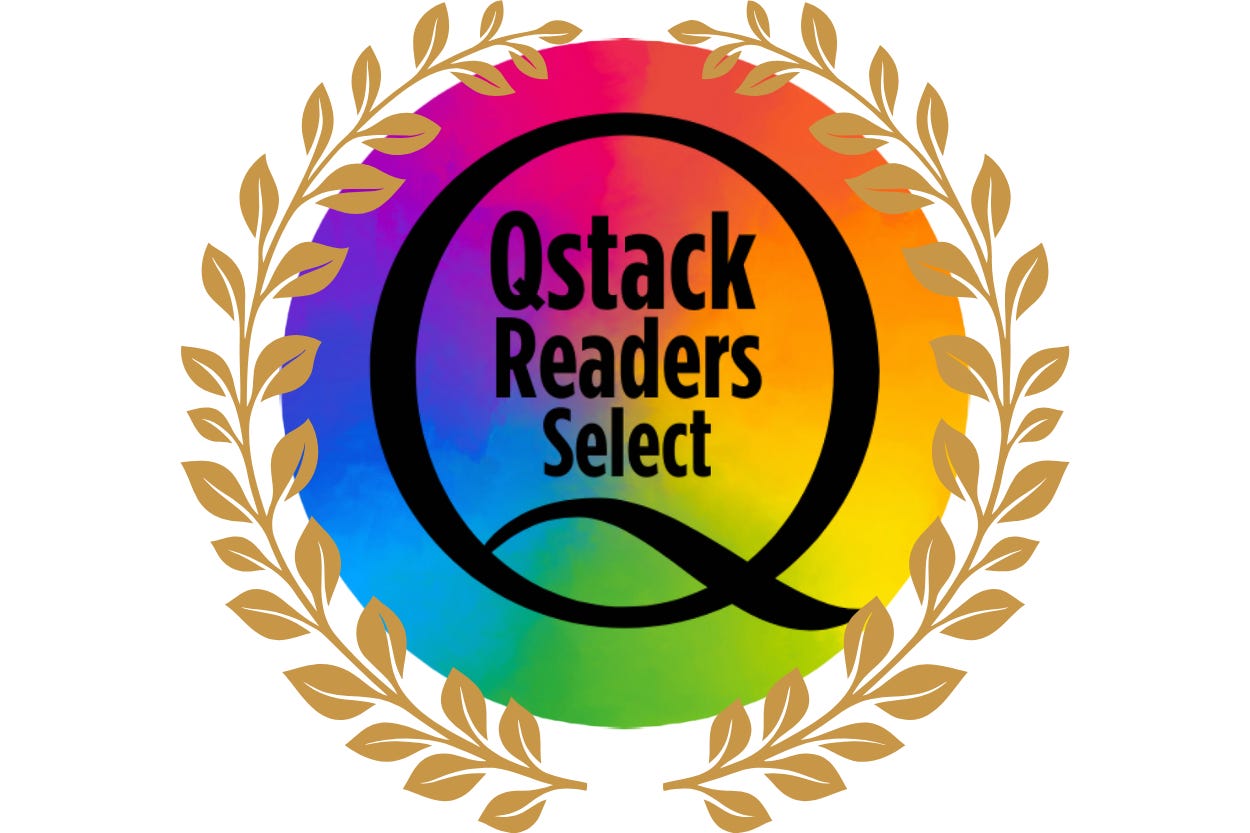



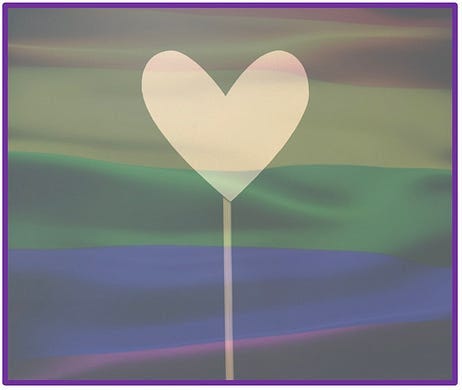


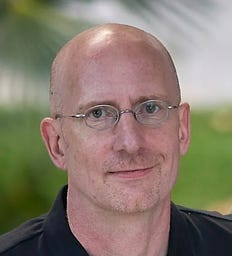


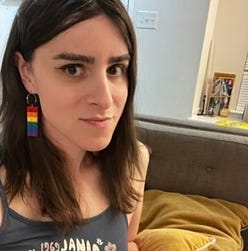













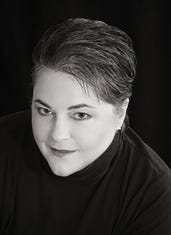


Thank you so much for featuring my work, Robin and Qstack! This is a huge honor. I really appreciate you amplifying my message of respect.
Appreciate this thoughtful curation, thank you ❤️🧡💛💚💙💜